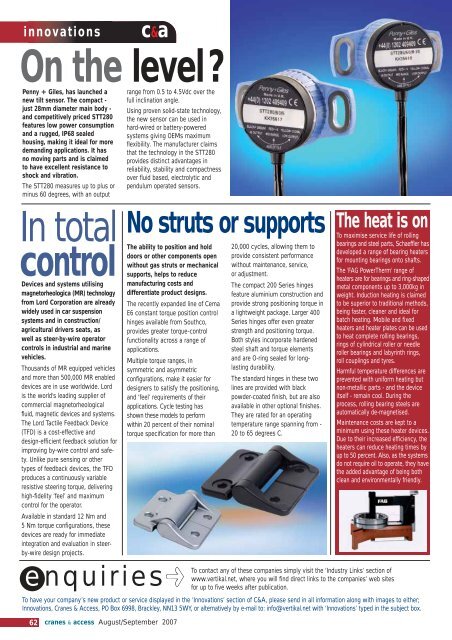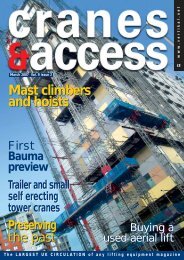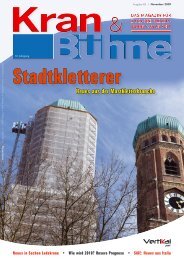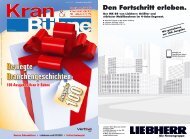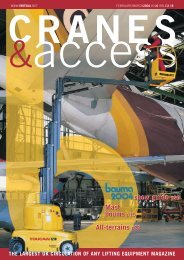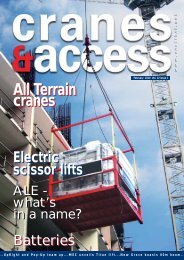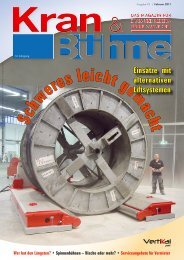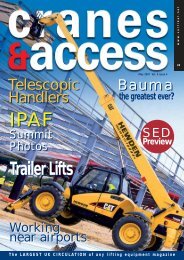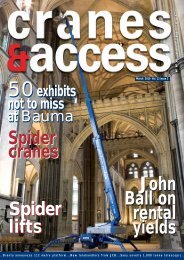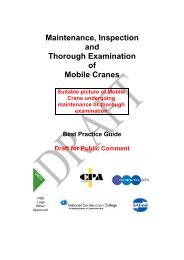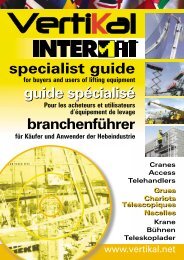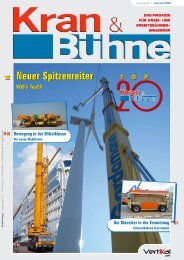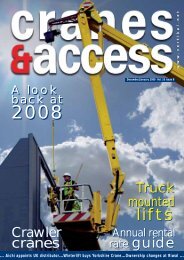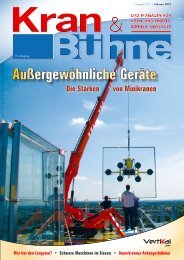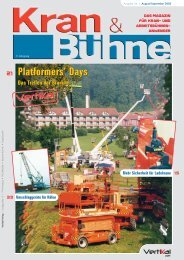c&a - Vertikal.net
c&a - Vertikal.net
c&a - Vertikal.net
You also want an ePaper? Increase the reach of your titles
YUMPU automatically turns print PDFs into web optimized ePapers that Google loves.
innovations c&a<br />
On the level?<br />
Penny + Giles, has launched a<br />
new tilt sensor. The compact -<br />
just 28mm diameter main body -<br />
and competitively priced STT280<br />
features low power consumption<br />
and a rugged, IP68 sealed<br />
housing, making it ideal for more<br />
demanding applications. It has<br />
no moving parts and is claimed<br />
to have excellent resistance to<br />
shock and vibration.<br />
The STT280 measures up to plus or<br />
minus 60 degrees, with an output<br />
In total<br />
control<br />
Devices and systems utilising<br />
mag<strong>net</strong>orheologica (MR) technology<br />
from Lord Corporation are already<br />
widely used in car suspension<br />
systems and in construction/<br />
agricultural drivers seats, as<br />
well as steer-by-wire operator<br />
controls in industrial and marine<br />
vehicles.<br />
Thousands of MR equipped vehicles<br />
and more than 500,000 MR enabled<br />
devices are in use worldwide. Lord<br />
is the world's leading supplier of<br />
commercial mag<strong>net</strong>orheological<br />
fluid, mag<strong>net</strong>ic devices and systems.<br />
The Lord Tactile Feedback Device<br />
(TFD) is a cost-effective and<br />
design-efficient feedback solution for<br />
improving by-wire control and safety.<br />
Unlike pure sensing or other<br />
types of feedback devices, the TFD<br />
produces a continuously variable<br />
resistive steering torque, delivering<br />
high-fidelity ‘feel’ and maximum<br />
control for the operator.<br />
Available in standard 12 Nm and<br />
5 Nm torque configurations, these<br />
devices are ready for immediate<br />
integration and evaluation in steerby-wire<br />
design projects.<br />
e nquiries<br />
range from 0.5 to 4.5Vdc over the<br />
full inclination angle.<br />
Using proven solid-state technology,<br />
the new sensor can be used in<br />
hard-wired or battery-powered<br />
systems giving OEMs maximum<br />
flexibility. The manufacturer claims<br />
that the technology in the STT280<br />
provides distinct advantages in<br />
reliability, stability and compactness<br />
over fluid based, electrolytic and<br />
pendulum operated sensors.<br />
The ability to position and hold<br />
doors or other components open<br />
without gas struts or mechanical<br />
supports, helps to reduce<br />
manufacturing costs and<br />
differentiate product designs.<br />
The recently expanded line of Cema<br />
E6 constant torque position control<br />
hinges available from Southco,<br />
provides greater torque-control<br />
functionality across a range of<br />
applications.<br />
Multiple torque ranges, in<br />
symmetric and asymmetric<br />
configurations, make it easier for<br />
designers to satisfy the positioning,<br />
and ‘feel’ requirements of their<br />
applications. Cycle testing has<br />
shown these models to perform<br />
within 20 percent of their nominal<br />
torque specification for more than<br />
To contact any of these companies simply visit the ‘Industry Links’ section of<br />
www.vertikal.<strong>net</strong>, where you will find direct links to the companies’ web sites<br />
for up to five weeks after publication.<br />
To have your company’s new product or service displayed in the ‘Innovations’ section of C&A, please send in all information along with images to either;<br />
Innovations, Cranes & Access, PO Box 6998, Brackley, NN13 5WY, or alternatively by e-mail to: info@vertikal.<strong>net</strong> with ‘Innovations’ typed in the subject box.<br />
62 cranes & access August/September 2007<br />
No struts or supports<br />
20,000 cycles, allowing them to<br />
provide consistent performance<br />
without maintenance, service,<br />
or adjustment.<br />
The compact 200 Series hinges<br />
feature aluminium construction and<br />
provide strong positioning torque in<br />
a lightweight package. Larger 400<br />
Series hinges offer even greater<br />
strength and positioning torque.<br />
Both styles incorporate hardened<br />
steel shaft and torque elements<br />
and are O-ring sealed for longlasting<br />
durability.<br />
The standard hinges in these two<br />
lines are provided with black<br />
powder-coated finish, but are also<br />
available in other optional finishes.<br />
They are rated for an operating<br />
temperature range spanning from -<br />
20 to 65 degrees C.<br />
The heat is on<br />
To maximise service life of rolling<br />
bearings and steel parts, Schaeffler has<br />
developed a range of bearing heaters<br />
for mounting bearings onto shafts.<br />
The 'FAG PowerTherm' range of<br />
heaters are for bearings and ring-shaped<br />
metal components up to 3,000kg in<br />
weight. Induction heating is claimed<br />
to be superior to traditional methods,<br />
being faster, cleaner and ideal for<br />
batch heating. Mobile and fixed<br />
heaters and heater plates can be used<br />
to heat complete rolling bearings,<br />
rings of cylindrical roller or needle<br />
roller bearings and labyrinth rings,<br />
roll couplings and tyres.<br />
Harmful temperature differences are<br />
prevented with uniform heating but<br />
non-metallic parts - and the device<br />
itself - remain cool. During the<br />
process, rolling bearing steels are<br />
automatically de-mag<strong>net</strong>ised.<br />
Maintenance costs are kept to a<br />
minimum using these heater devices.<br />
Due to their increased efficiency, the<br />
heaters can reduce heating times by<br />
up to 50 percent. Also, as the systems<br />
do not require oil to operate, they have<br />
the added advantage of being both<br />
clean and environmentally friendly.


